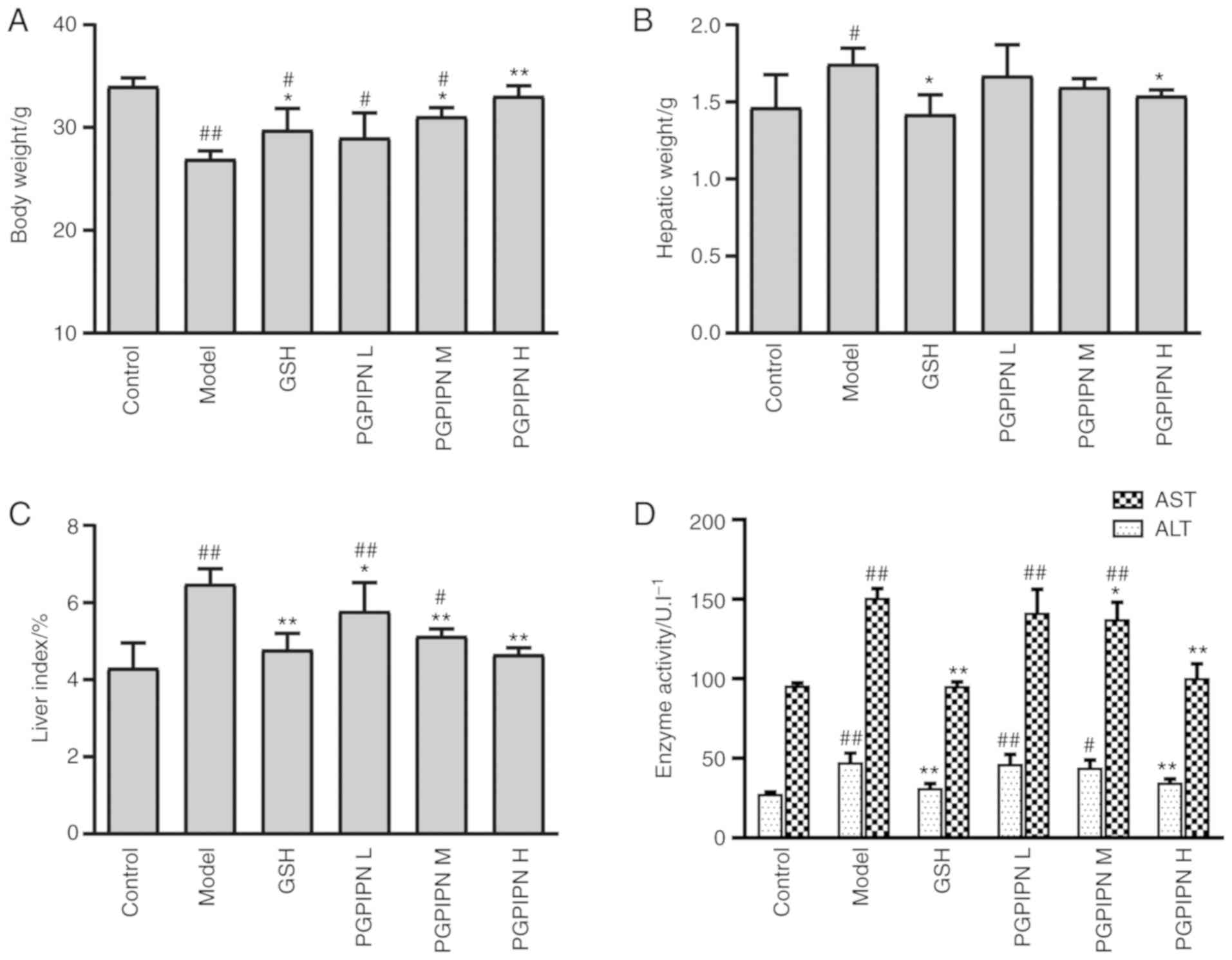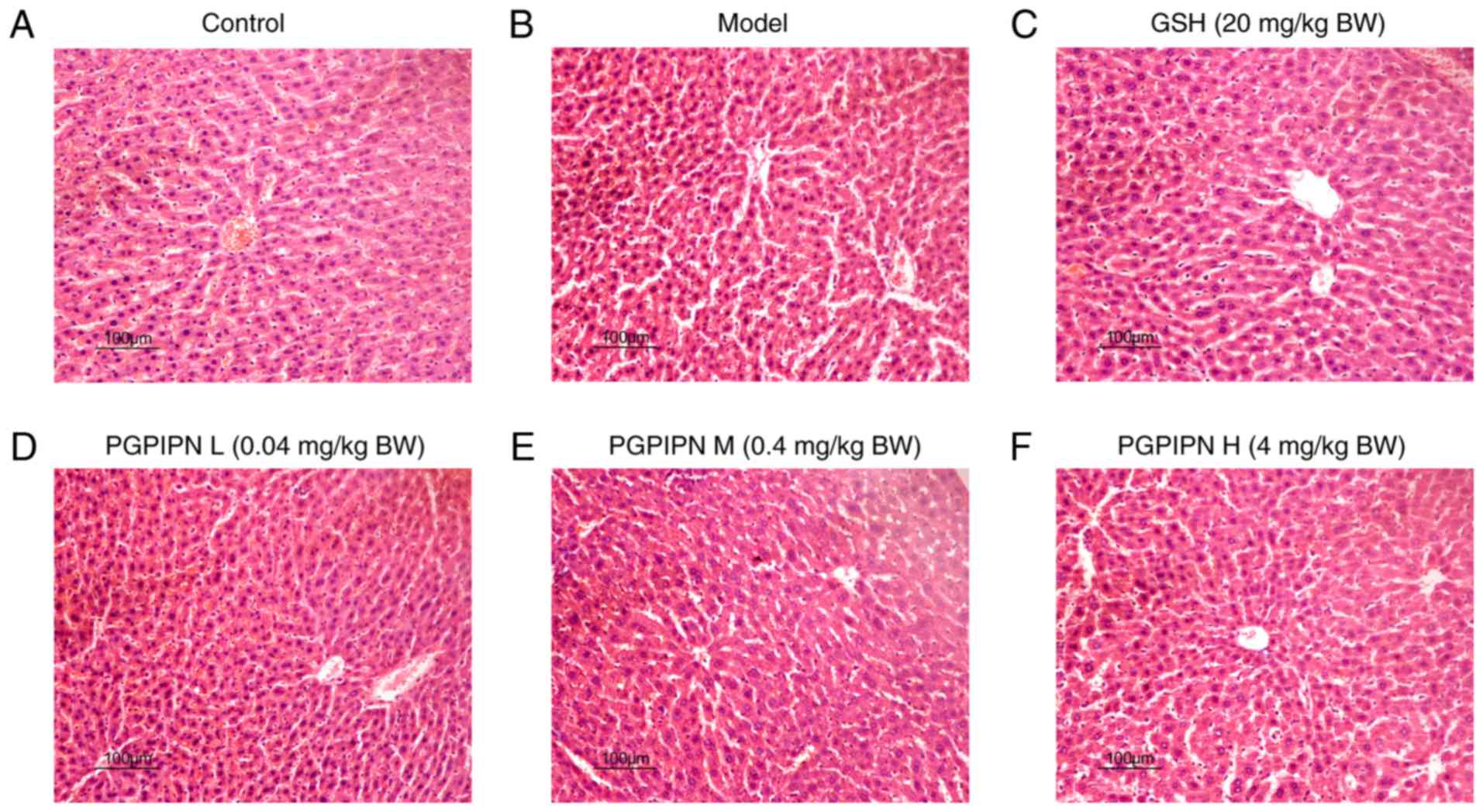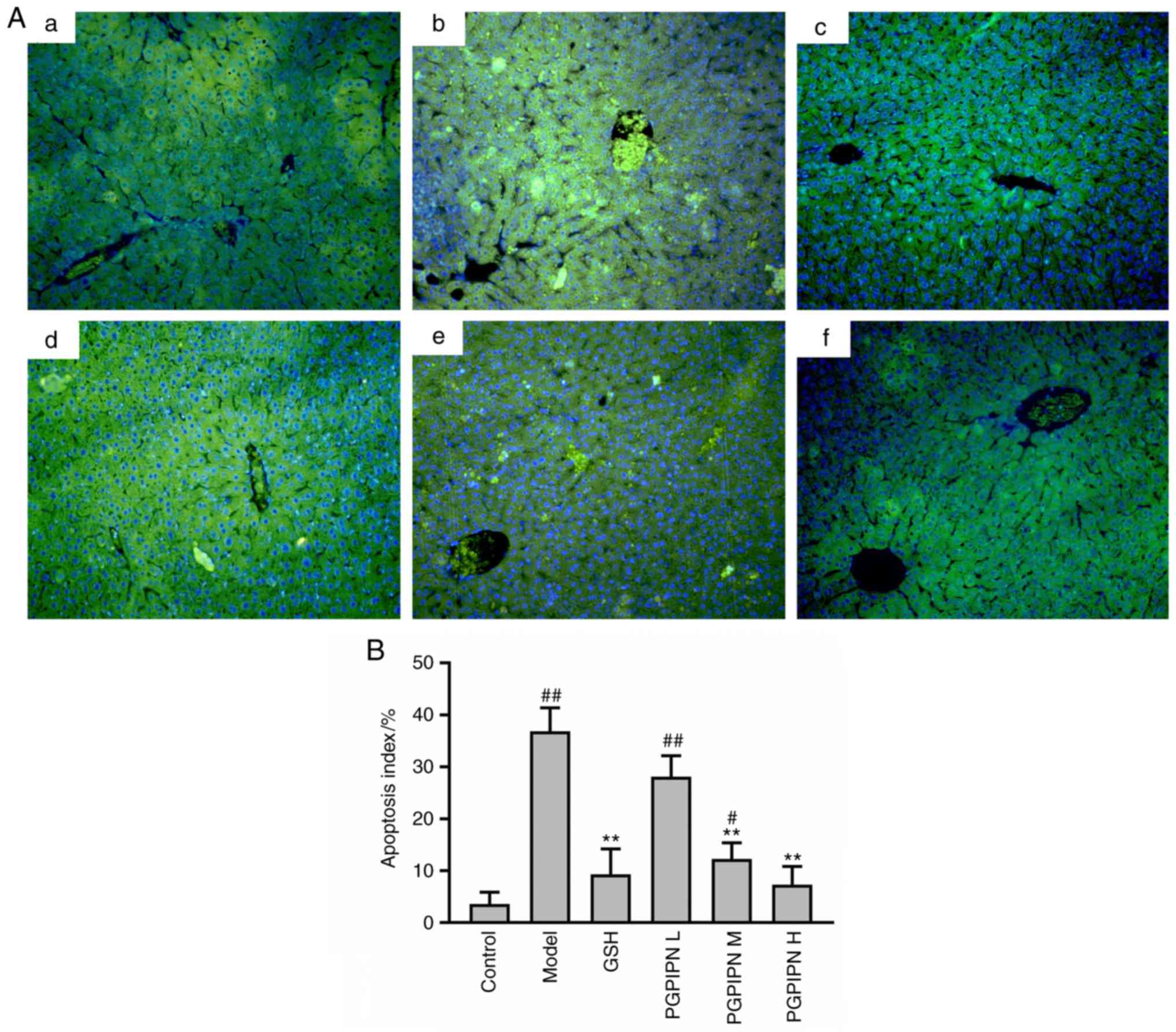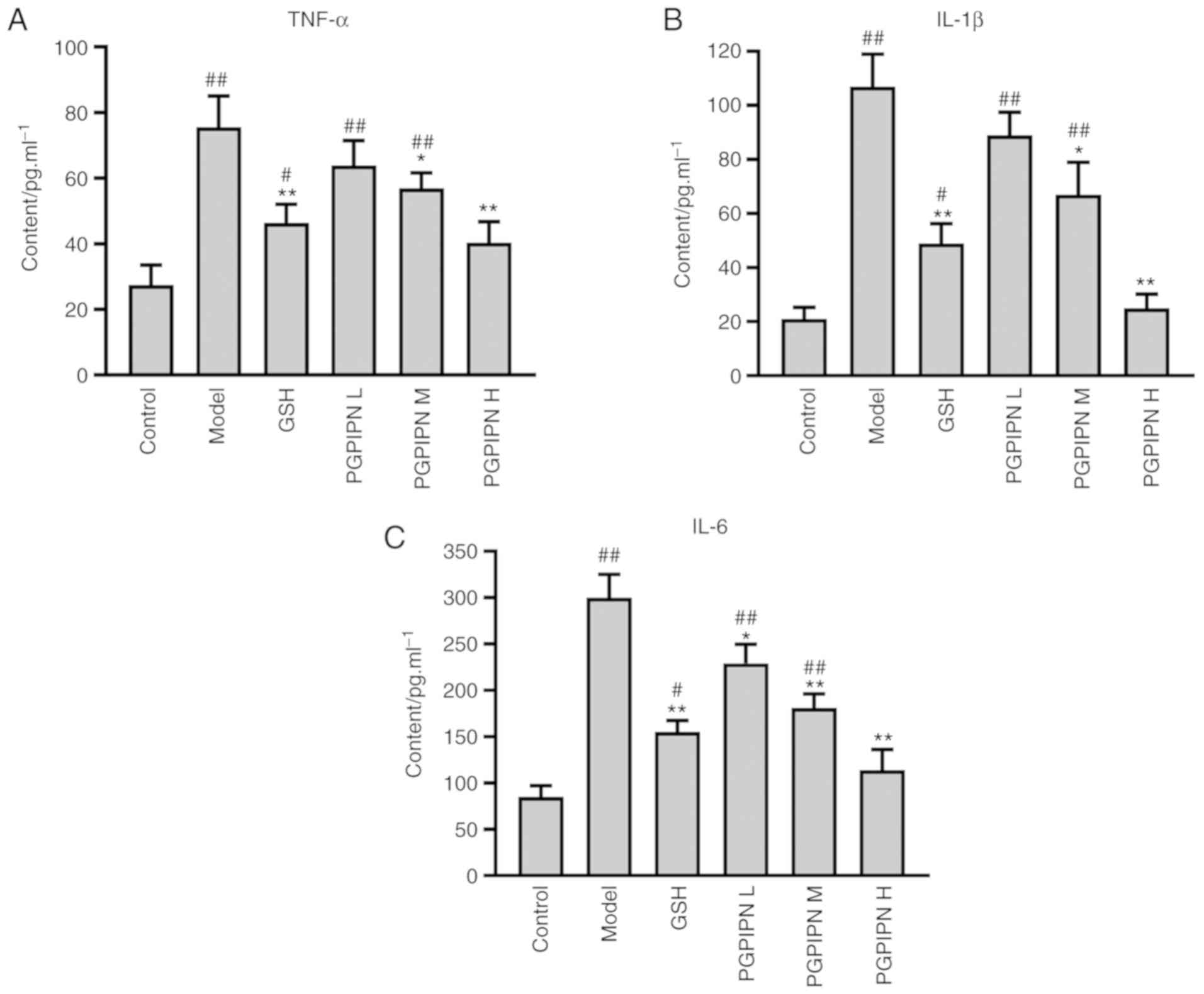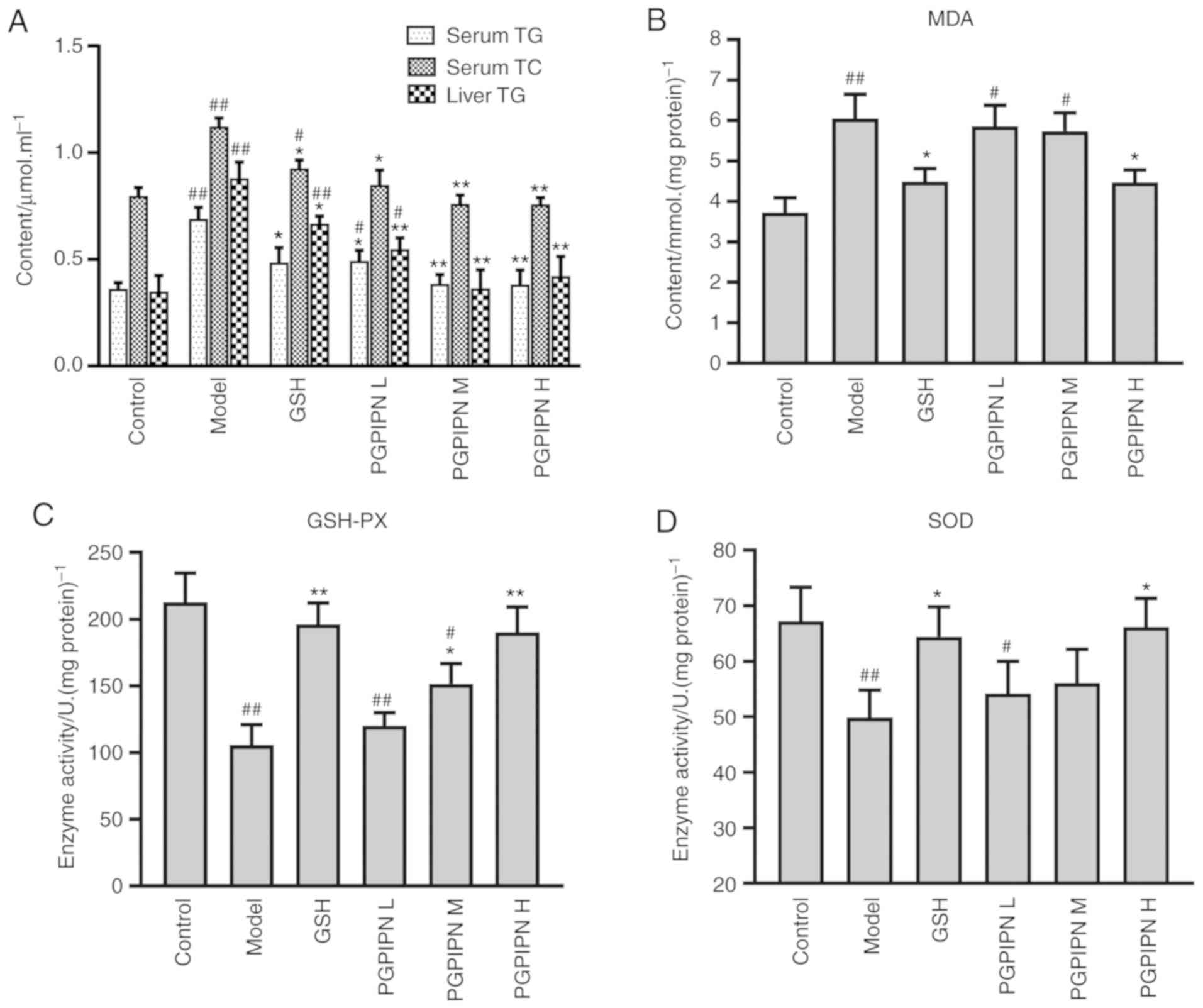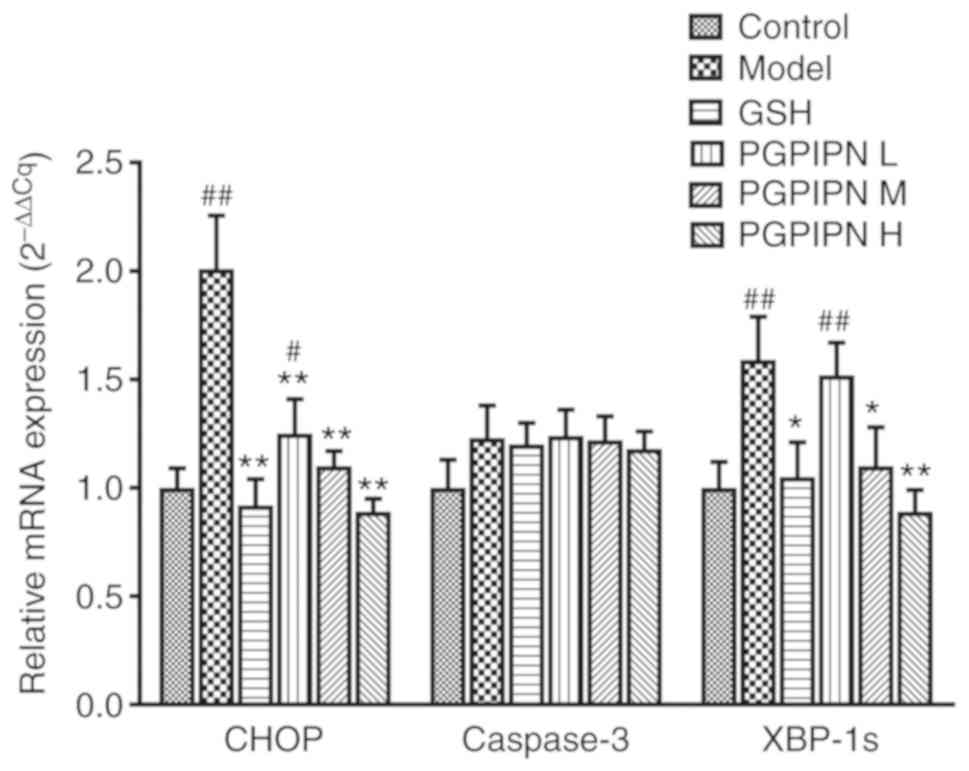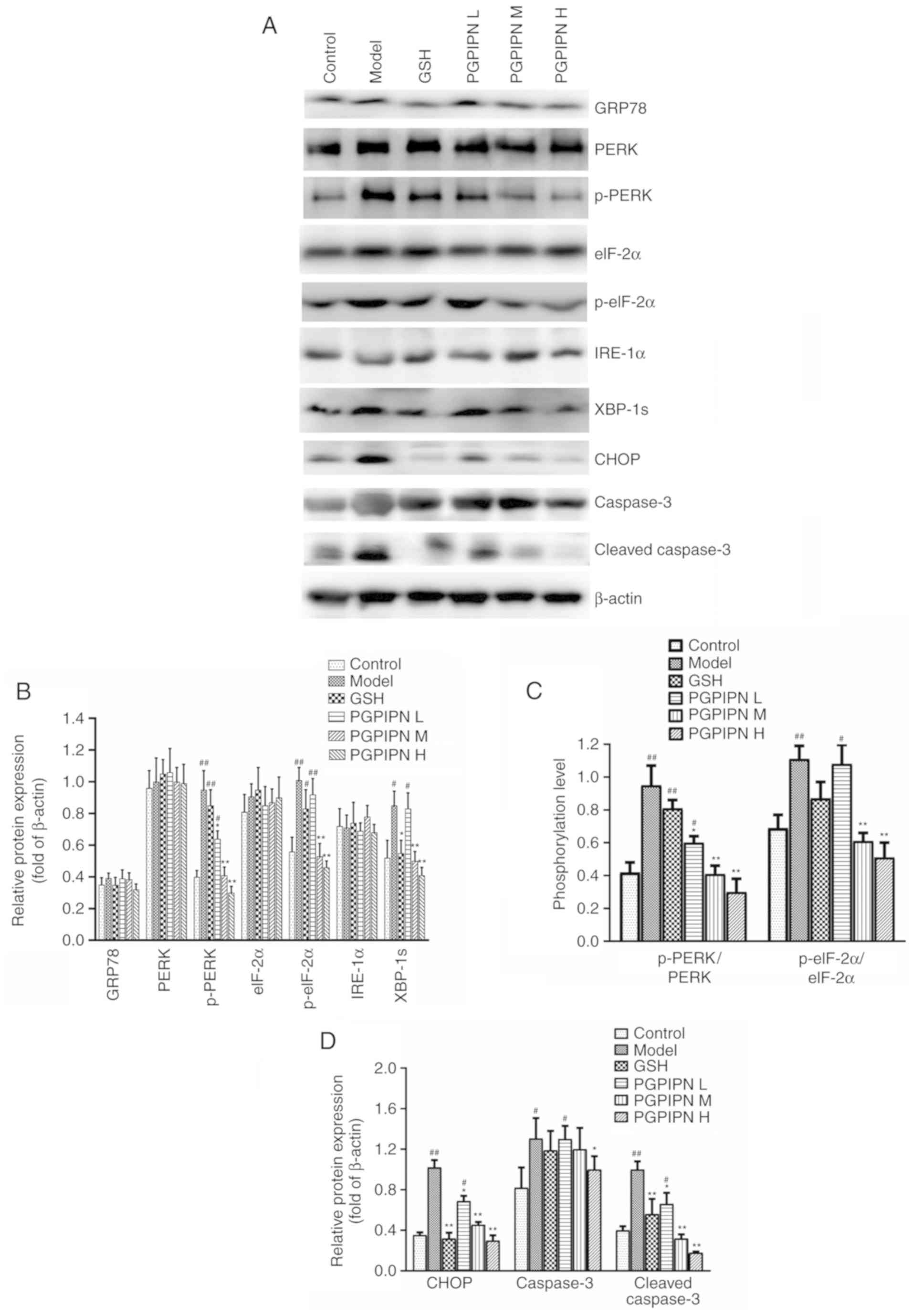|
1
|
Marroni CA, Fleck AM Jr, Fernandes SA,
Galant LH, Mucenic M, de Mattos Meine MH, Mariante-Neto G and
Brandão ABM: Liver transplantation and alcoholic liver disease:
History, controversies, and considerations. World J Gastroenterol.
24:2785–2805. 2018. View Article : Google Scholar : PubMed/NCBI
|
|
2
|
Jiang Z, Wang J, Xue H, Wang M, Jiang H,
Liang Y, Dias AC, Gregory M, Chen C and Zhang X: Protective effect
of wild Corni fructus methanolic extract against acute alcoholic
liver injury in mice. Redox Rep. 22:338–345. 2017. View Article : Google Scholar
|
|
3
|
Louvet A and Mathurin P: Alcoholic liver
disease: Mechanisms of injury and targeted treatment. Nat Rev
Gastroenterol Hepatol. 12:231–242. 2015. View Article : Google Scholar : PubMed/NCBI
|
|
4
|
O'Shea RS, Dasarathy S and McCullough AJ;
Practice Guideline Committee of the American Association for the
Study of Liver Diseases; Practice Parameters Committee of the
American College of Gastroenterology: Alcoholic liver disease.
Hepatology. 51:307–328. 2010. View Article : Google Scholar
|
|
5
|
Torruellas C, French SW and Medici V:
Diagnosis of alcoholic liver disease. World J Gastroentero.
20:11684–11699. 2014. View Article : Google Scholar
|
|
6
|
Stickel F, Datz C, Hampe J and Bataller R:
Erratum: Pathophysiology and management of alcoholic liver disease:
Update 2016. Gut Liver. 11:4472017. View
Article : Google Scholar : PubMed/NCBI
|
|
7
|
Liu Y, Chen X, Qiu M, Chen W, Zeng Z and
Chen Y: Emodin ameliorates ethanol-induced fatty liver injury in
mice. Pharmacology. 94:71–77. 2014. View Article : Google Scholar : PubMed/NCBI
|
|
8
|
Stickel F, Datz C, Hampe J and Bataller R:
Pathophysiology and management of alcoholic liver disease: Update
2016. Gut Liver. 11:173–188. 2017. View
Article : Google Scholar : PubMed/NCBI
|
|
9
|
Marcone S, Haughton K, Simpson PJ, Belton
O and Fitzgerald DJ: Milk-derived bioactive peptides inhibit human
endothelial-monocyte interactions via PPAR-γ dependent regulation
of NF-κB. J Inflamm (Lond). 12:12015. View Article : Google Scholar
|
|
10
|
Saadi S, Saari N, Anwar F, Abdul Hamid A
and Ghazali HM: Recent advances in food biopeptides: Production,
biological functionalities and therapeutic applications.
Biotechnology Advances. 33:80–116. 2015. View Article : Google Scholar
|
|
11
|
Gokhale AS and Satyanarayanajois S:
Peptides and peptidomimetics as immunomodulators. Immunotherapy.
6:755–774. 2014. View Article : Google Scholar : PubMed/NCBI
|
|
12
|
Lonnerdal B: Nutritional and physiologic
significance of human milk proteins. Am J Clin Nutr.
77:1537S–1543S. 2003. View Article : Google Scholar : PubMed/NCBI
|
|
13
|
Qi N, Liu C, Yang H, Shi W, Wang S, Zhou
Y, Wei C, Gu F and Qin Y: Therapeutic hexapeptide (PGPIPN) prevents
and cures alcoholic fatty liver disease by affecting the
expressions of genes related with lipid metabolism and oxidative
stress. Oncotarget. 8:88079–88093. 2017. View Article : Google Scholar : PubMed/NCBI
|
|
14
|
Wu Y, Pan X, Zhang S, Wang W, Cai M, Li Y,
Yang F and Guo H: Protective effect of corn peptides against
alcoholic liver injury in men with chronic alcohol consumption: A
randomized double-blind placebo-controlled study. Lipids Health
Dis. 13:1922014. View Article : Google Scholar : PubMed/NCBI
|
|
15
|
Meisel H: Biochemical properties of
regulatory peptides derived from milk proteins. Biopolymers.
43:119–128. 1997. View Article : Google Scholar : PubMed/NCBI
|
|
16
|
Gevaert B, Veryser L, Verbeke F,
Wynendaele E and De Spiegeleer B: Fish hydrolysates: A regulatory
perspective of bioactive peptides. Protein Pept Lett. 23:1052–1060.
2016. View Article : Google Scholar : PubMed/NCBI
|
|
17
|
Kanwar JR, Kanwar RK, Sun X, Punj V, Matta
H, Morley SM, Parratt A, Puri M and Sehgal R: Molecular and
biotechnological advances in milk proteins in relation to human
health. Curr Protein Pept Sci. 10:308–338. 2009. View Article : Google Scholar : PubMed/NCBI
|
|
18
|
Gill HS, Doull F, Rutherfurd KJ and Cross
ML: Immunoregulatory peptides in bovine milk. Br J Nutr. 84(Suppl
1): S111–S117. 2000. View Article : Google Scholar
|
|
19
|
Fiat AM, Migliore-Samour D, Jolles P,
Drouet L, Bal dit Sollier C and Caen J: Biologically active
peptides from milk proteins with emphasis on two examples
concerning antithrombotic and immunomodulating activities. J Dairy
Sci. 76:301–310. 1993. View Article : Google Scholar : PubMed/NCBI
|
|
20
|
Meisel H and FitzGerald RJ: Biofunctional
peptides from milk proteins: Mineral binding and cytomodulatory
effects. Curr Pharm Des. 9:1289–1295. 2003. View Article : Google Scholar : PubMed/NCBI
|
|
21
|
Zhao M, Wei C, Yang X, Zhou J, Wang J, Gu
F, Lei T and Qin Y: The milk-derived hexapeptide PGPIPN inhibits
the invasion and migration of human ovarian cancer cells by
regulating the expression of MTA1 and NM23H1 genes. Int J Oncol.
48:1721–1729. 2016. View Article : Google Scholar : PubMed/NCBI
|
|
22
|
Livak KJ and Schmittgen TD: Analysis of
relative gene expression data using real-time quantitative PCR and
the 2(-Delta Delta C(T)) method. Methods. 25:402–408. 2001.
View Article : Google Scholar
|
|
23
|
Green MR and Sambrook J and Sambrook J:
Molecular cloning: A laboratory manual. Cold Spring Harbor
Laboratory Press; Cold Spring Harbor, NY: 2012
|
|
24
|
Lv SX and Qiao X: Isovitexin (IV) induces
apoptosis and autophagy in liver cancer cells through endoplasmic
reticulum stress. Biochem Biophys Res Commun. 496:1047–1054. 2018.
View Article : Google Scholar : PubMed/NCBI
|
|
25
|
Wang W, Gu F, Wei C, Tang Y, Zheng X, Ren
M and Qin Y: PGPIPN, a therapeutic hexapeptide, suppressed human
ovarian cancer growth by targeting BCL2. PLoS One. 8:e607012013.
View Article : Google Scholar : PubMed/NCBI
|
|
26
|
Phelan M and Kerins D: The potential role
of milk-derived peptides in cardiovascular disease. Food Funct.
2:153–167. 2011. View Article : Google Scholar : PubMed/NCBI
|
|
27
|
Kreider RB, Iosia M, Cooke M, Hudson G,
Rasmussen C, Chen H, Mollstedt O and Tsai MH: Bioactive properties
and clinical safety of a novel milk protein peptide. Nutr J.
10:992011. View Article : Google Scholar : PubMed/NCBI
|
|
28
|
Purohit V, Gao B and Song BJ: Molecular
mechanisms of alcoholic fatty liver. Alcohol Clin Exp Res.
33:191–205. 2009. View Article : Google Scholar :
|
|
29
|
You M, Jogasuria A, Taylor C and Wu J:
Sirtuin 1 signaling and alcoholic fatty liver disease.
Hepatobiliary Surg Nutr. 4:88–100. 2015.PubMed/NCBI
|
|
30
|
Qu BG, Wang H, Jia YG, Su JL, Wang ZD,
Wang YF, Han XH, Liu YX, Pan JD and Ren GY: Changes in tumor
necrosis factor-alpha, heat shock protein 70, malondialdehyde, and
super-oxide dismutase in patients with different severities of
alcoholic fatty liver disease: A prospective observational study.
Medicine Baltimore. 94:e6432015. View Article : Google Scholar
|
|
31
|
Abdelmegeed MA, Banerjee A, Jang S, Yoo
SH, Yun JW, Gonzalez FJ, Keshavarzian A and Song BJ: CYP2E1
potentiates binge alcohol-induced gut leakiness, steatohepatitis,
and apop-tosis. Free Radic Biol Med. 65:1238–1245. 2013. View Article : Google Scholar : PubMed/NCBI
|
|
32
|
Zhou JY, Jiang ZA, Zhao CY, Zhen Z, Wang W
and Nanji AA: Long-term binge and escalating ethanol exposure
causes necro-inflammation and fibrosis in rat liver. Alcohol Clin
Exp Res. 37:213–222. 2013. View Article : Google Scholar
|
|
33
|
Cederbaum AI: Alcohol metabolism. Clin
Liver Dis. 16:667–685. 2012. View Article : Google Scholar : PubMed/NCBI
|
|
34
|
Ding H and Wen Z: Overexpression of C-sis
inhibits H2O2-induced Buffalo rat liver cell apoptosis in vitro and
alleviates liver injury in a rat model of fulminant hepatic
failure. Int J Mol Med. 42:873–882. 2018.PubMed/NCBI
|
|
35
|
Xing H, Jia K, He J, Shi C, Fang M, Song
L, Zhang P, Zhao Y, Fu J and Li S: Establishment of the tree shrew
as an alcohol-induced fatty liver model for the study of alcoholic
liver diseases. PLoS One. 10:e01282532015. View Article : Google Scholar : PubMed/NCBI
|
|
36
|
He Y, Liu Q, Li Y, Yang X, Wang W, Li T,
Zhang W, Cui Y, Wang C and Lin R: Protective effects of
hydroxysafflor yellow A (HSYA) on alcohol-induced liver injury in
rats. J Physiol Biochem. 71:69–78. 2015. View Article : Google Scholar : PubMed/NCBI
|
|
37
|
Kimura M, Yokoyama A and Higuchi S:
Aldehyde dehydro-genase-2 as a therapeutic target. Expert Opin Ther
Targets. 23:955–966. 2019. View Article : Google Scholar : PubMed/NCBI
|
|
38
|
Ding RB, Tian K, Cao YW, Bao JL, Wang M,
He C, Hu Y, Su H and Wan JB: Protective effect of panax notoginseng
saponins on acute ethanol-induced liver injury is associated with
ameliorating hepatic lipid accumulation and reducing
ethanol-mediated oxidative stress. J Agric Food Chem. 63:2413–2422.
2015. View Article : Google Scholar : PubMed/NCBI
|
|
39
|
Mehaffey E and Majid DSA: Tumor necrosis
factor-α, kidney function, and hypertension. Am J Physiol Renal
Physiol. 313:F1005–F1008. 2017. View Article : Google Scholar
|
|
40
|
Slaats J, Ten Oever J, van de Veerdonk FL
and Netea MG: IL-1β/IL-6/CRP and IL-18/ferritin: Distinct
inflammatory programs in infections. PLoS Pathog. 12:e10059732016.
View Article : Google Scholar
|
|
41
|
Unver N and McAllister F: IL-6 family
cytokines: Key inflammatory mediators as biomarkers and potential
therapeutic targets. Cytokine Growth Factor Rev. 41:10–17. 2018.
View Article : Google Scholar : PubMed/NCBI
|
|
42
|
Wang H, Li J, Gai Z, Kullak-Ublick GA and
Liu Z: TNF-α deficiency prevents renal inflammation and oxidative
stress in obese mice. Kidney Blood Press Res. 42:416–427. 2017.
View Article : Google Scholar
|
|
43
|
Yang L, Sun YY, Liu YR, Yin NN, Bu FT, Yu
HX, Du XS, Li J and Huang C: PTP1B promotes macrophage activation
by regulating the NF-KB pathway in alcoholic liver injury. Toxicol
Lett. 319:11–21. 2020. View Article : Google Scholar
|
|
44
|
Lee JS, An Y, Yoon CJ, Kim JY, Kim KH,
Freeman AF, Yim JJ, Shin EC, Holland SM, Lee EY and Ju YS: Germline
gain-of-function mutation of STAT1 rescued by somatic mosaicism in
immune dysregulation-polyendocrinopathy-enteropathy-X-linked-like
disorder. J Allergy Clin Immunol. 145:1017–1021. 2020. View Article : Google Scholar
|
|
45
|
Starkel P, Schnabl B, Leclercq S, Komuta
M, Bataller R, Argemi J, Palma E, Chokshi S, Hellerbrand C,
Maccioni L, et al: Deficient IL-6/Stat3 signaling, high TLR7, and
type I interferons in early human alcoholic liver disease: A triad
for liver damage and fibrosis. Hepatol Commun. 3:867–882.
2019.PubMed/NCBI
|
|
46
|
Senft D and Ronai ZA: UPR, autophagy, and
mitochondria crosstalk underlies the ER stress response. Trends
Biochem Sci. 40:141–148. 2015. View Article : Google Scholar : PubMed/NCBI
|
|
47
|
Shimizu A, Kaira K, Yasuda M, Asao T and
Ishikawa O: Clinical and pathological significance of er stress
marker (BiP/GRP78 and PERK) expression in malignant melanoma.
Pathol Oncol Res. 23:111–116. 2017. View Article : Google Scholar
|
|
48
|
Kouznetsova VL, Hu H, Teigen K, Zanetti M
and Tsigelny IF: Cripto stabilizes GRP78 on the cell membrane.
Protein Sci. 27:653–661. 2018. View Article : Google Scholar :
|
|
49
|
Li Y, Guo Y, Tang J, Jiang J and Chen Z:
New insights into the roles of CHOP-induced apoptosis in ER stress.
Acta Biochim Biophys Sin (Shanghai). 46:629–640. 2014. View Article : Google Scholar
|
|
50
|
Malhi H and Kaufman RJ: Endoplasmic
reticulum stress in liver disease. J Hepatol. 54:795–809. 2011.
View Article : Google Scholar
|
|
51
|
Jo HJ, Yang JW, Park JH, Choi ES, Lim CS,
Lee S and Han CY: Endoplasmic reticulum stress increases DUSP5
expression via PERK-CHOP pathway, leading to hepatocyte death. Int
J Mol Sci. 20:43692019. View Article : Google Scholar :
|
|
52
|
Yakin M, Seo B and Rich A:
Tunicamycin-induced endoplasmic reticulum stress up-regulates
tumour-promoting cytokines in oral squamous cell carcinoma.
Cytokine. 120:130–143. 2019. View Article : Google Scholar : PubMed/NCBI
|
|
53
|
Chen HP, Zhou Y, Qin XF, Wang L, Lin XF,
Chen H and Hu YB: Endoplasmic reticulum stress regulates autophagy
and tumor necrosis factor-α secretion of RAW264.7 cells induced by
silica. Zhonghua Lao Dong Wei Sheng Zhi Ye Bing Za Zhi. 38:91–95.
2020.In Chinese. PubMed/NCBI
|
|
54
|
Pinto AP, da Rocha AL, Cabrera EMB,
Marafon BB, Kohama EB, Rovina RL, Simabuco FM, Bueno Junior CR, de
Moura LP, Pauli JR, et al: Role of interleukin-6 in inhibiting
hepatic autophagy markers in exercised mice. Cytokine.
130:1550852020. View Article : Google Scholar : PubMed/NCBI
|
|
55
|
Fiedorowicz E, Jarmolowska B, Iwan M,
Kostyra E, Obuchowicz R and Obuchowicz M: The influence of µ-opioid
receptor agonist and antagonist peptides on peripheral blood
mononuclear cells (PBMCs). Peptides. 32:707–712. 2011. View Article : Google Scholar
|















